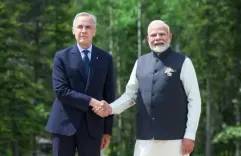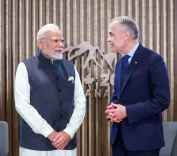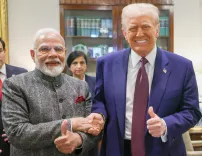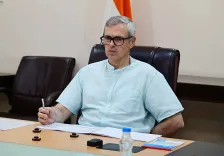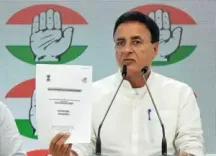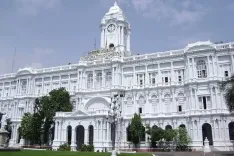Was Pak Army Chief Asim Munir's US visit disrupted by PTI protests?
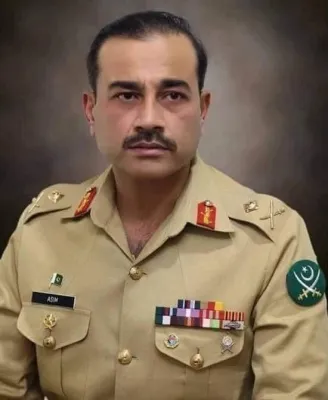
Synopsis
Key Takeaways
- Pakistani Army Chief Asim Munir's U.S. visit faced significant protests.
- Demonstrators accused him of human rights violations.
- His discussions will focus on regional security and military cooperation.
- The protests indicate growing dissent within the Pakistani diaspora.
- Munir's comments on India complicate diplomatic relations.
Washington, June 18 (NationPress) The official visit of Pakistani Army Chief Field Marshal Asim Munir to the United States has been significantly impacted by extensive protests led by members of the Pakistani diaspora and supporters of former Prime Minister Imran Khan's Pakistan Tehreek-e-Insaf (PTI) party.
While Munir's visit is being framed as a crucial step towards enhancing military and strategic relations with the U.S., the backlash from overseas Pakistanis abruptly turned his stay at the luxurious Four Seasons Hotel in Washington into a hub of fervent demonstrations.
Demonstrators raised slogans accusing Munir of human rights abuses, labeling him as "Pakistanio ke qatil" and "Islamabad ke qatil" — which translates to "killer of Pakistanis" and "killer of Islamabad," respectively.
As official convoys approached the hotel, protesters erupted into loud chants. A widely circulated video showed one protester shouting, "Geedad, geedad, geedad (jackal, jackal, jackal)," a derogatory term used to imply cowardice and deceit.
The video rapidly gained traction online and was characterized by analysts as a significant public embarrassment for Pakistan's military leadership.
Pakistani-Americans protesting outside the Four Seasons hotel expressed that their aim was to remind General Asim Munir of the alleged crimes he has committed against the Pakistani populace.
In a video shared by PTI USA, Imran Khan's sister, Noreen Khan Niazi, declared, "The protest in America was executed by patriotic Pakistanis — the very individuals who sustain Pakistan's economy through remittances. No one compensated them. No one coerced them. They stood up of their own volition — for justice, for Imran Khan, and for Pakistan."
PTI USA further stated in a post on X, "Overseas Pakistanis erupted in chants against Asim Munir during his U.S. visit. A massive protest took place — digital vans, posters, and powerful slogans reverberated through the streets."
Nazia Imtiaz Hussain, Executive Director of The Alliance Organisation, also voiced her dissent online: "We are here to protest the criminal dictator of Pakistan. Shame on every bootlicker who showed up in support of fascism — you didn’t just betray democracy, you disrespected the suffering of millions."
Despite the uproar, Munir is scheduled to meet U.S. President Donald Trump on Wednesday at 1:00 p.m. (local time) in the White House's Cabinet Room, as outlined in the President's official agenda.
This meeting will be a working lunch and follows shortly after the White House clarified that Munir was not invited to the U.S. Army's 250th-anniversary celebrations on June 14, contradicting earlier claims from Pakistani officials.
According to Dawn, Munir's five-day official visit is primarily bilateral and includes discussions with U.S. Secretary of State Marco Rubio and Defense Secretary Pete Hegseth.
The discussions are expected to center on regional security, military collaboration, and counterterrorism initiatives.
His visit occurs against the backdrop of ongoing military tensions between Iran and Israel, now entering its sixth consecutive day.
President Trump recently demanded "unconditional surrender" from Iran, while Munir has previously expressed solidarity with Tehran — a divergence in positions that could complicate dialogue between Washington and Islamabad.
This marks Munir's first official trip to the U.S. since the April 22 terror attack on Indian tourists in Pahalgam, Jammu and Kashmir, which resulted in the deaths of 26 civilians.
The Resistance Front, an offshoot of the Pakistan-based terror group Lashkar-e-Taiba, has claimed responsibility for the massacre.
Just days prior to the attack, Munir made provocative comments about India, reportedly reiterating Islamabad's strategy to "bleed India by a thousand cuts."
This statement, combined with the timing of the attack, has drawn significant criticism in Indian diplomatic circles.

